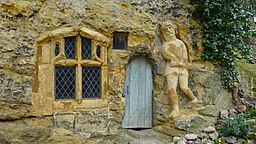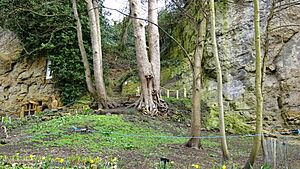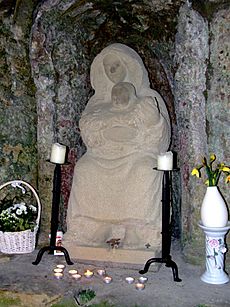Chapel of Our Lady of the Crag facts for kids
Quick facts for kids Chapel of Our Lady of the Crag |
|
|---|---|
| Chapel of Our Lady of the Quarry | |

The chapel entrance and the carved knight
|
|
| Location | Knaresborough, North Yorkshire |
| OS grid | SE351564 |
| Length | 12 ft long, 8 ft wide and 7 ft high |
| Discovery | Man made |
| Entrances | 1 |
| Difficulty | Restricted opening times |
| Hazards | Caution required. |
| Access | By a rough path and steps |
The Chapel of Our Lady of the Crag is a very old chapel. It was carved right into the sandstone cliff face. You can find it in an old quarry near the River Nidd in Knaresborough. It was built in the early 1400s!
This chapel was a special place for prayer, called a Marian shrine. People used to visit it on their way to the old Knaresborough Abbey. The stone quarry nearby was used to build Knaresborough Castle and other buildings. Sometimes, people called this chapel the Quarry Chapel or Our Lady of the Quarry.
Contents
Exploring the Chapel and Its Entrance
The Chapel of Our Lady of the Crag is a very important old building. It's so special that it's a Grade I Listed Building. You can reach it by following a narrow path and some steps from Abbey Road.
Inside, the chapel has a carved altar. It also has a special space for a statue, called a canopied niche. Look up to see the vaulted ceiling, which looks like a stone archway. You might also spot roof bosses, which are carved decorations where parts of the ceiling meet. There are pillars with flowery tops, a Celtic head, and a small basin called a piscina.
The Mysterious Knight Statue
Outside the chapel, a large carving of a medieval knight stands guard. This knight might be as old as the chapel itself. However, some experts think it was carved later, between 1695 and 1739. We know for sure it was there in 1814 because a famous poet, William Wordsworth, wrote about it. The knight's head is separate from its body. It might have been re-carved during the Victorian times.
In 1907, an old map showed a path from the chapel to a nearby place called the 'House in the Rock'. You can still see steps cut into the sandstone, but they are very worn now.
The Chapel's Long History
This special prayer chapel was likely built by a master stoneworker. His name was probably 'John the Mason'. He built it around 1408 or 1409. King Henry IV of England even gave John permission to dig and build the chapel in the quarry. He could keep it for his whole life for a small yearly payment.
The Legend of John the Mason
There's a famous story about how the chapel was built. One day, John the Mason was working in the quarry. He saw a rock fall that was about to hit his son! John couldn't reach his son in time. So, he prayed to the Virgin Mary for help. A miracle happened! The stones changed direction, and his son was safe. John promised to build a chapel to thank Mary for saving his son.
Changes Over Time
The chapel stopped being used for worship after King Henry VIII's Reformation. But in 1916, it became a Roman Catholic church again. This happened after it was bought by Ampleforth Abbey. At that time, three carved heads on the right wall were removed. A new statue of Our Lady of the Crag was placed inside.
Many travelers have written about the chapel over the years. Pilgrims visited it between the 1500s and 1600s. People often confused it with the Holy Cross Chapel and cave of St Robert of Knaresborough. That chapel is further down the River Nidd.
Over many centuries, people built simple homes near the cliff. You can still see holes in the sandstone where posts for these homes once stood. By the end of the Victorian era, these simple shelters were gone.
In 2019, someone damaged the chapel. They broke the glass in the medieval window frames. Luckily, people in the community donated money to fix it. This showed how much the chapel means to everyone nearby!
Bringing the Chapel Back to Life
The windows have been repaired, and the medieval knight statue has been fixed. Inside, a new statue of Madonna and Child was carved and placed in the chapel in 2000. Since 2017, a group called the Chapel of Our Lady of the Crag Trust has taken care of the site.
The original 1919 statue of 'Our Lady of the Crag' is now in the gardens of St Mary's Catholic church.
 | Laphonza Butler |
 | Daisy Bates |
 | Elizabeth Piper Ensley |



